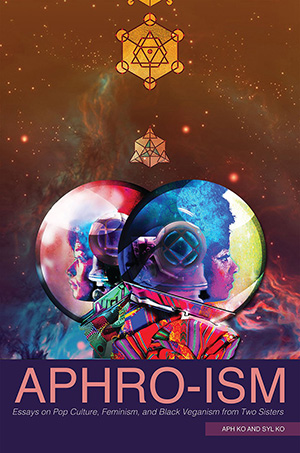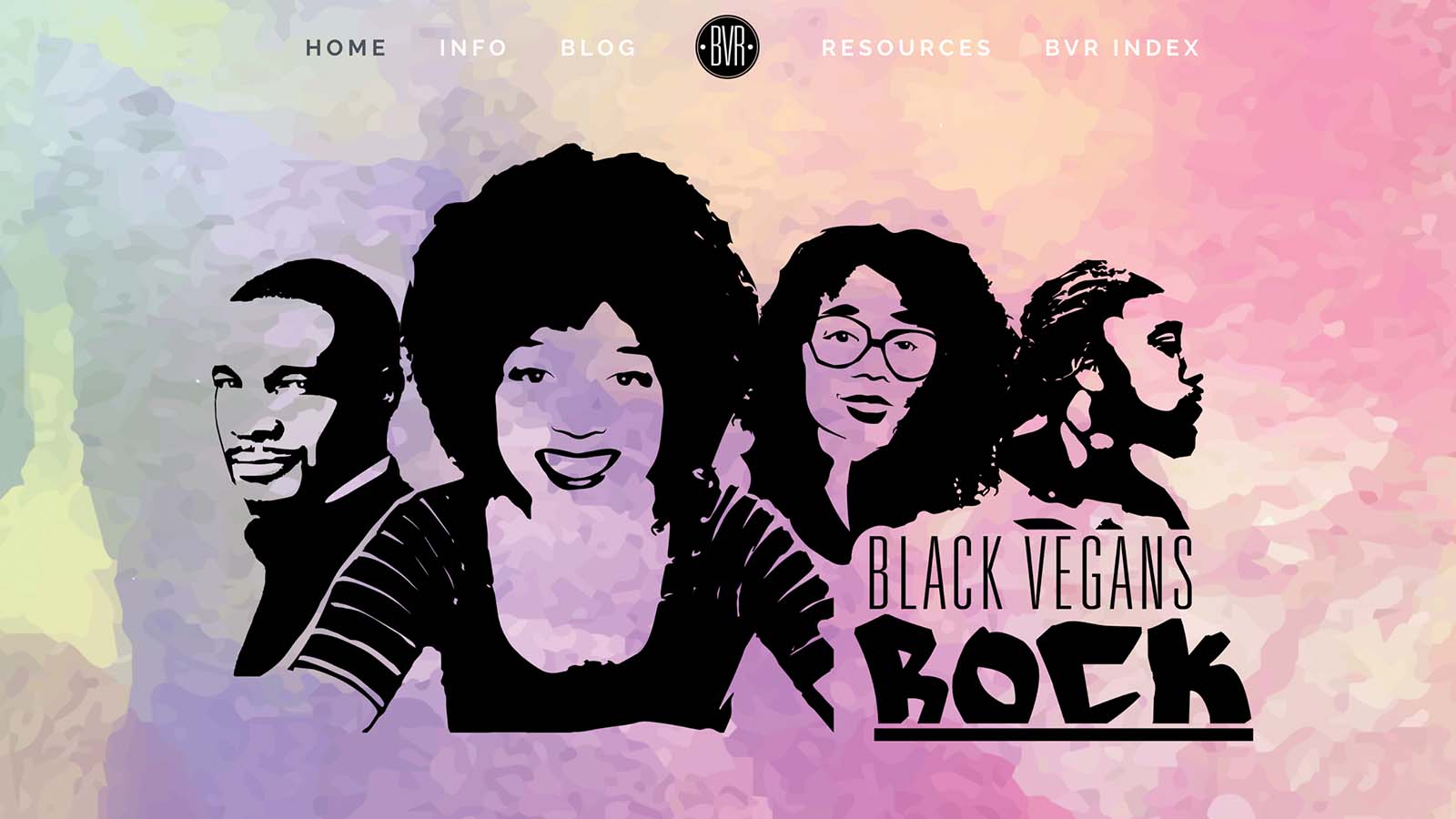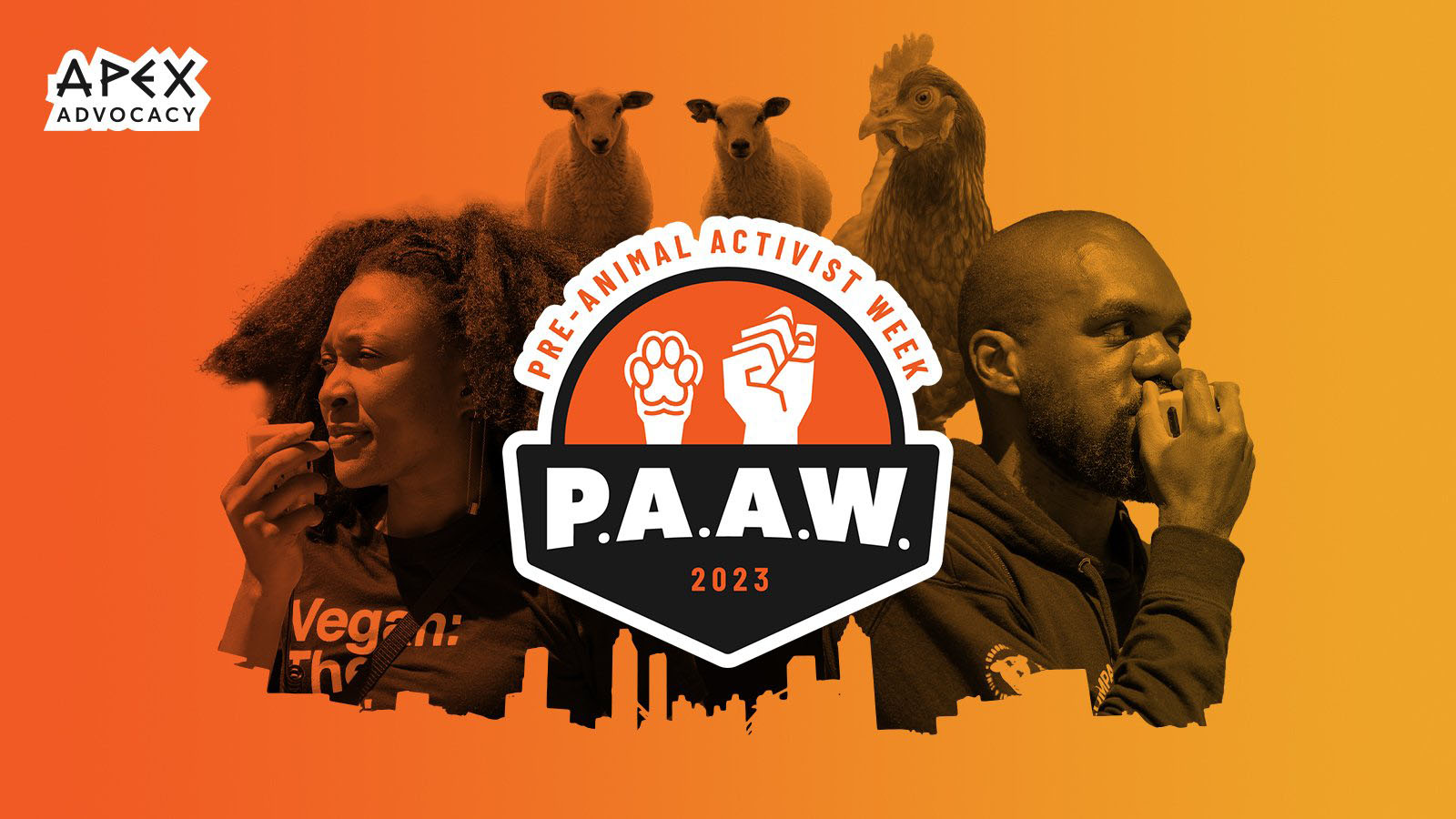
Author
John "Zehn" Baskerville, PMP

Black Vegans' Vision Of Total Liberation Poised To Shape Our Future
Black Vegans' Vision Of Total Liberation Poised To Shape Our Future
Unraveling the deep-seated connections between human civil rights and the fight for animal liberation and how Black Vegans are forging new paths in the age-old battle against universal oppression.
As a child in the 80s, I remember riding down the Grand Concourse in the Bronx, New York. The black Ford we were in felt like an enormous vessel, reminiscent of the era's classic design – boats on wheels with generous hoods and even longer trunks. As I sat in the backseat, the city's vibrancy hummed around us, its rhythm and energy a relentless soundtrack. Yet, amidst the city's fever, a pocket of stillness existed for me. The outside world utterly entranced me. My young eyes fixated upwards and outwards at the grandeur of the subway tracks that ran parallel to the street, elevated high above the road. To my young mind, they seemed like titanic wonders, metallic serpents threading through the urban landscape.

The serenity of that moment was briefly interrupted as I was handed a piece of chicken from the front seat. My gaze shifted from the colossal structures outside to the food I now held in my hand. I took a bite, then paused, noticing something I hadn't before - A prominent vein ran through the thigh. My hesitation was not just about identifying parts of a body but a more profound realization. That vein once pulsed with life, carrying vitality throughout a living being.
An innocent child's curiosity ensued. I bombarded my parents with questions, trying to reconcile the meat in my hand with the life it once had. Their answers, while certainly meant to soothe, deepened my introspection. My distaste for chicken grew in the following years, prompting many to dub me a "picky eater." However, beneath this label was a profound personal transformation slowly unfolding.
A decade later, the transformation reached its crescendo. At 17, a realization could no longer be denied or rationalized, sweeping away years of impartiality. With conviction, I declared that I would no longer consume animals. A promise I've kept to this day. A single decision rooted in animal liberation with an undercurrent to "fight the power." What felt for the longest time to be a singular decision is now taking the shape of a collective uprising to dismantle the normative politics of our food system.
Black Americans Challenge the Status Quo: A Renewed Perspective on Our Food System.
Recent data has painted a compelling picture: Black Americans are the country's fastest-growing demographic embracing plant-based diets. A Gallup poll reported that 31% of nonwhite respondents cut back on their meat consumption within the year prior compared to 19% of white respondents.
|
A survey conducted by the Vegetarian Resource Group found that 8% of Black Americans reported never eating meat, fish, or poultry, compared to 3.4% of the overall population. |
More recent studies show that Black Americans are two to three times as likely to go plant-based than White Americans.
While it's easy to simplify this surge as merely a health-driven trend, a more profound undercurrent is helping to propel this movement. This undercurrent has its roots in the shared histories of oppression faced by Black Americans and animals, especially within industrial agriculture.
The renowned activist Dick Gregory once noted, "Because I'm a civil rights activist, I am also an animal rights activist. Animals and humans suffer and die alike. Violence causes the same pain, the same spilling of blood, the same stench of death, the same arrogant, cruel and vicious taking of life. We shouldn't be a part of it." ― Dick Gregory
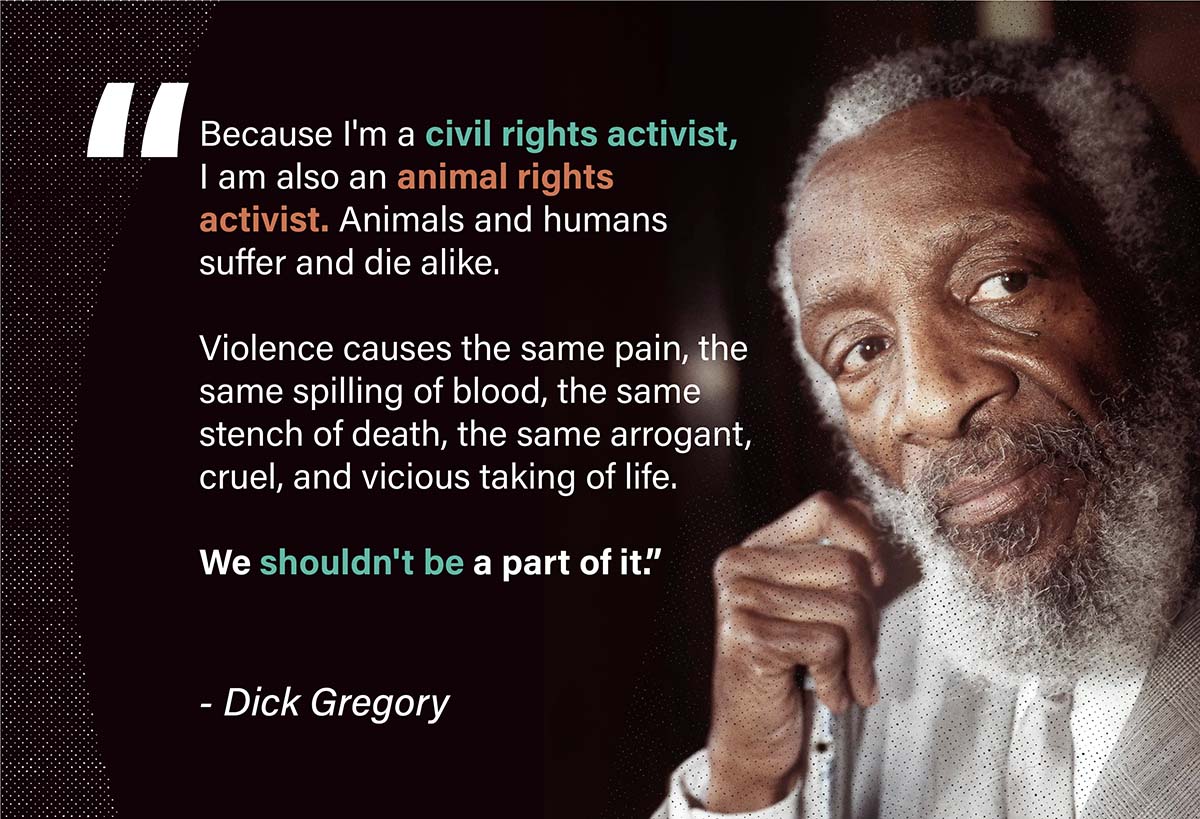
This statement not only underscores the depth of empathy shared by many Black leaders toward animals but also introduces a concept that some might find unfamiliar: intersectionality.
Intersectionality is the interconnected nature of social categorizations such as race, class, and gender, regarded as creating overlapping and interdependent systems of discrimination or disadvantage. In the context of Black veganism, this concept demonstrates the intertwined narratives of human and animal liberation. The growth of the Black vegan movement is not just about food choices; it's a call against the systems of oppression that have historically targeted Black individuals and animals.
In this article, our spotlight is on a unique subset of a broader movement: Black vegan activists who center their advocacy primarily, if not entirely, around the rights and perspectives of animals. While these activists might not garner as much attention as those championing plant-based diets for health reasons, both groups undoubtedly play pivotal roles in challenging and transforming the prevailing oppressive systems. The synergy between these two groups is critical; each strengthens the other, forming a powerful coalition whose outcome is greater animal liberation. Adopting a plant-based diet predominantly focuses on personal health, whereas embracing veganism intrinsically values the animal's well-being. As we delve deeper into this rich history, we must discern the nuanced differences between a health-driven plant-based approach and a fundamental vegan ethos. A unified front within the broader movement, which celebrates and values each other's contributions, strives towards a cohesive effort that benefits the animals most.
Plant-Based vs. Vegan: Understanding the Distinction
In recent years, a noticeable transformation has swept across our communities, primarily driven by influential Black figures—celebrities, chefs, and health advocates—championing the merits of a plant-based diet. This surge in plant-based advocacy is indeed a beacon of hope, especially when one considers the troubling legacies of food injustice, food apartheid, and the dire food deserts that have, for too long, plagued the Black community. It's heartening to witness our collective endeavor to decolonize our plates, reclaiming our health and wellness in the face of systemic food inequalities. This shift towards healthier eating habits is a victory in its own right, one that should be wholeheartedly celebrated.
Yet, the thrust of this article aims to illuminate a less prominent but equally significant undercurrent within the Black community—the rise of veganism, driven not by self-interest but by a profound empathy for animals and their intrinsic rights. While the intersections of the civil rights movement and animal liberation form the heart of our discourse, it is pivotal to understand the distinction between "plant-based" and "vegan."
1. Plant-Based: At its core, a plant-based diet emphasizes consuming whole foods derived from plants—fruits, vegetables, grains, seeds, and nuts. Many Black celebrities and chefs endorse this diet, primarily for its health benefits, which are particularly crucial given our community's historical health disparities. However, choosing plant-based often stems from personal health considerations rather than an ethical stance.
2. Veganism: Veganism is a philosophy and way of living that seeks to exclude, as far as is possible and practical, all forms of exploitation of, and cruelty to, animals for food, clothing, or any other purpose. It's not just about what one eats. Still, it encompasses a broader lifestyle choice that rejects using animals for clothing, entertainment, or exploitation. At its essence, veganism centers on the animals, their autonomy, and their liberation. When one adopts a vegan lifestyle, their diet inherently becomes plant-based. However, the reverse isn't necessarily true—a plant-based diet does not make one vegan.
Understanding these nuances shows that while plant-based diets and veganism advocate for healthier, cruelty-free choices, veganism's soul lies in an unwavering commitment to animal rights. As we delve deeper into the intersections of civil rights and animal liberation, this ethos of veganism, with its steadfast emphasis on animal well-being, will be our guiding light. Now, let's delve deeper into the intersection of Black civil rights and animal liberation.
Before 'Vegan' Became a Movement: The Lesser-Known Vegan Journeys of Civil Rights Leaders and Pioneers
In the thick of the civil rights movement, leaders, deeply involved in their battle against systemic racism and oppression, began to draw parallels to the sufferings of animals in the food industry. The connection was profound, with leaders recognizing that the tools and systems used to oppress them also wield their oppression against animals.
Numerous Black civil rights activists eventually embraced veganism, understanding the interconnections between various forms of oppression. Angela Davis, Coretta Scott King, Dick Gregory, and many others turned to veganism as an extension of their commitment to justice, equality, and liberation for all beings.
This parallelism wasn't just abstract; it had historical foundations. The "breeding" of enslaved people, an alarming aspect of the slave trade, bore striking similarities to treating animals in modern industrial farming. Enslavers, recognizing the economic benefits, forced unions between enslaved people to produce offspring. The forced reproduction ensured a continuous supply of enslaved individuals to fuel the system without needing external procurement. Similarly, cows undergo forced insemination in the dairy industry to ensure a constant supply of milk-producing offspring.
In their proximity to oppression, these leaders found an unsettling truth: when an oppressor seeks to dominate, they will employ those tactics against anyone or anything they deem inferior or subservient. The system, therefore, was not just racially prejudiced but inherently oppressive, blind to species, and deaf to the cries of both humans and animals.
The lens of feminism within the civil rights movement further exposed these parallels. As women's demand for equality and autonomy grew louder, some activists noticed an uncomfortable correlation between women's exploitation and female animals' exploitation in the food system. Female animals, such as dairy cows, are subjected to forced insemination, producing offspring against their will. These procedures aren't gentle requests or natural processes but deeply invasive actions without consent. Their offspring are promptly separated from their mothers to be fed into other channels of the system or discarded as waste byproducts with no monetary value to the industry.
In the egg industry, a similar harrowing fate awaits the newly hatched chicks. Immediately after birth, male chicks, having no value in egg production, are separated from their mothers and females. These innocent beings are routinely rounded up as part of a standard industry practice—not an exception—and dumped into grinders while still alive. The rationale? They can't lay eggs, and they're not the breed grown for meat. Thus, in the eyes of the industry, their brief lives are ended in moments of unrelenting cruelty.
In the dairy and egg industry, female animals are trapped in a cycle of production and exploitation. Their existence is narrowly defined by their capacity to reproduce. When their bodies are exhausted, reaching their limit, and can no longer reproduce, they are deemed "spent" or without value. At that point, they meet a grim end. Such practices underscore a chilling resonance with the historical and ongoing exploitation of women, where value is measured by utility or reproductive potential. This alignment of systemic oppression across species and genders is not just profoundly unsettling but beyond cruel.
For many leaders, while the bulk of their advocacy centered on the immediate and palpable human oppression they faced daily, their personal choices reflected a broader understanding of interconnected oppressions. While figures like Angela Davis may not have been on the frontlines for animal rights during the heights of their civil rights advocacy, their evolution in understanding and vocalizing the importance of animal liberation, as Davis herself believes, highlights its significance as a pivotal revolutionary movement Today.
In an interview, Angela Davis expressed, "I'm sometimes really disappointed that many of us can assume that we are these radical activists, but we don't know how to reflect on the food that we put in our own bodies. We don't realize the extent to which we are implicated in the whole process of capitalism by participating uncritically in the food politics offered us by the great corporations."
|
Then, in a moment that resembled a great exhale, she confessed, "You know, I usually don't mention that I'm vegan. But that has evolved. I think it's the right moment to talk about it because it is, I think, a part of a revolutionary perspective. How can we not only discover more compassionate relations with human beings? But how can we develop compassionate relations with the other creatures with whom we share this planet? And that would mean challenging the whole capitalist industrial form of food production." |
Davis continues, "And I think that the lack of critical engagement with the food that we eat demonstrates the extent to which the commodity form has become the primary way in which we perceive the world... And so I think that would really be revolutionary, to develop a kind of repertoire, a habit of imagining the relations, the human relations, and the non-human relations, behind all of the objects that constitute our environment."
|
In an interview, the iconic Cicely Tyson candidly shared her deeply personal journey towards vegetarianism, linking it with a pivotal historical moment. She said, "When Martin Luther King was assassinated, I was so stunned by that that I became a vegetarian, and I've been that most of my life." |
The weight of that revelation — connecting her dietary choices to the shock of a monumental tragedy — speaks volumes about the intricate weave of personal and societal experiences that influence our decisions. However, in what felt like a scene directly lifted from the satirical film 'Don't Look Up,' the host's response was a bewilderingly trivial "Wow, vegetables, vegetables," before abruptly and awkwardly cutting to a commercial break. Their reaction reduced her profound testimony to a mere commentary on greens, bypassing the depth and gravity of what she'd just unveiled.
The oversight, perhaps unintentional, denied us all a chance to delve deeper into the psyche of an individual grappling with the weight of racial injustice and its ripple effects on personal choices. Despite rigorous searches, I've found no additional interviews, writings, or insights that shed light on the intricacies of Tyson's sentiments. And so, her profound revelation remains an enigma (to me), a glimmer of insight into the deep depths to which the devastating impacts of oppression can shape individual paths.
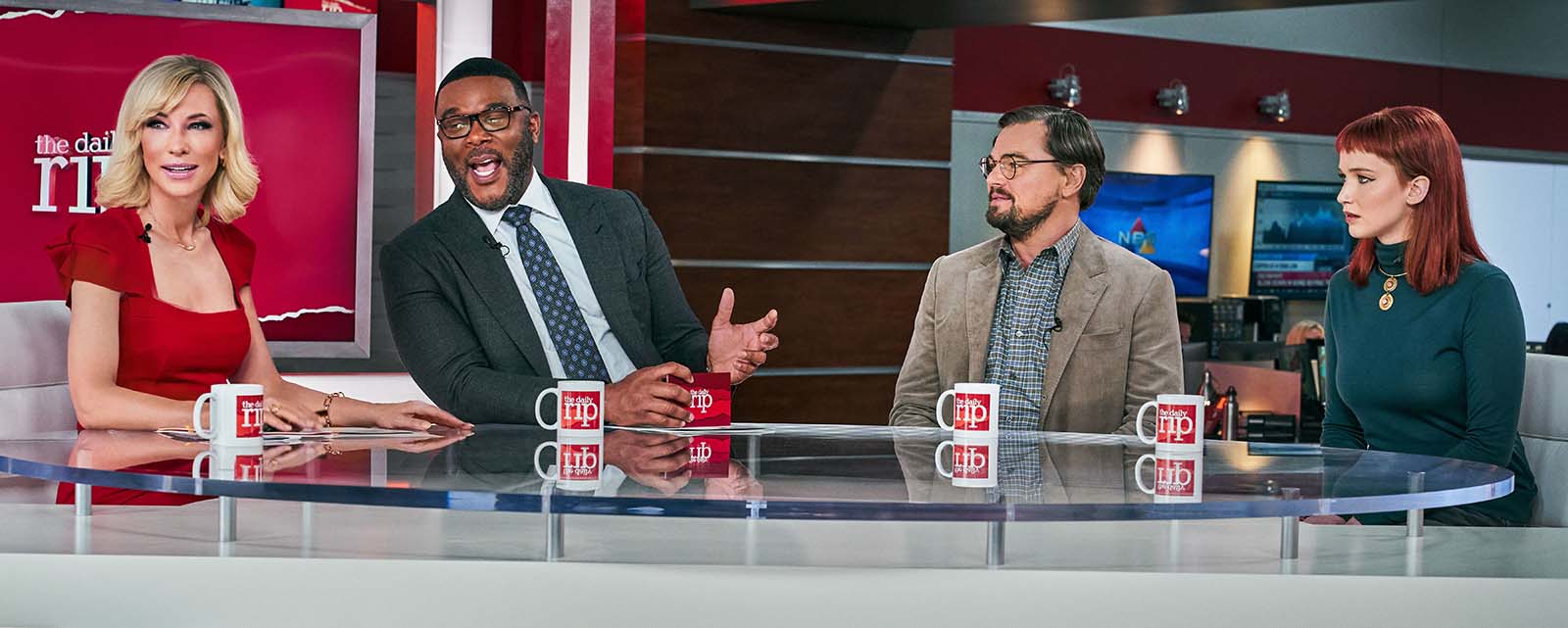
Scene from the movie 'Don't Look Up'
Superiority Vs. Sameness - Neither Are A Thing
Before delving deeper, let's clear the air of common misconceptions about sameness and superiority—bookends of misunderstanding that often overshadow and constrain our conversations about animal liberation.
When we explore the concept of sameness and equality, we must delve beyond superficial understandings. Additionally, saying that humans and animals are different is not a framework of superiority. It doesn't preclude anyone from having their ideas about what superiority is. Still, superiority isn't a thing in this context. In the same manner, nor is sameness for that matter. Instead, it's an acknowledgment of the vast tapestry of life, where each strand is uniquely wonderful, without arguing whether that makes one party the same or the other inferior. Simply put, neither is a thing. A cautionary tale - Conversations that start on either side of those anchors will remain anchored.
Imagine, for a moment, how humans have dreamt of flight, penned tales about it, and even built machines to emulate it. Yet, we will never know the profound serenity an eagle feels when it stretches out its wings, catches the thermal currents, and even naps on the invisible cushions of the wind. As humans, we've romanced the idea of sleeping on a cloud - Some birds can. Google it; yes, some birds can sleep in the sky.
Then, consider the resilience of many insects. As winter approaches and temperatures plunge, these tiny creatures transform. They produce antifreeze-like chemicals to prevent the formation of ice crystals in their bodies, enabling them to endure the harshest climates. They freeze without freezing, in a state of suspended animation, only to awaken with the warmth of spring, a testament to nature's incredible adaptability.
Now, turn your gaze to the ocean's depths, where the octopus, an enigma of the underwater world, thrives. Octopuses exhibit cognitive abilities that astound researchers. Their intelligence is profoundly different from ours, yet undeniably remarkable. Where our intelligence exists in our head, their intelligence lives in their body. What is fascinating is their decentralized nervous system, where two-thirds of an octopus's neurons reside in its arms, meaning these limbs can think and act semi-independently. Imagine if our limbs had such a degree of autonomy! An octopus can camouflage and mimic its surroundings, almost without sight. They use other senses, such as touch and smell, to gather information about their surroundings. This allows them to camouflage even in environments where they cannot see well, such as in murky water or at night. It changes its skin's color, texture, and pattern in a split second, not just for camouflage but also for communication. This dynamic display is like a silent language of art and emotion played out on their skin, something humans can only marvel at.
Humans, of course, can do none of the above. We can't replicate the incredible feats of the octopus, nor can we truly comprehend the world as they experience it. But this isn't about comparing intelligence or abilities. It's about recognizing the animal kingdom's vast spectrum of intelligence and adaptability. Just as we marvel at human achievements, so should we stand in awe of the octopus, lion, elephant, rhino, whale, dolphin, black widow, honey bee, and countless other species, each demonstrating brilliance uniquely. It's not about creating a scale of superiority based on what humans can achieve versus what animals can't. Instead, it's about marveling at the infinite ways life manifests its beauty and capabilities. Our differences are not a scale to measure superiority along a linear spectrum but a canvas depicting the vastness and richness of existence. Each being, with its unique capabilities and experiences, paints a part of this grand picture. Recognizing and celebrating these differences does not require us to be the same. It only asks us to appreciate life in all its multifaceted splendor, understanding that every being adds an irreplaceable brushstroke to the masterpiece of existence.
Now that we've sidelined the concepts of superiority vs. sameness, we can recenter our consciousness around liberation free of these frameworks and deconstruct the pillars of oppression.
Deconstructing The Pillars of Oppression: How Systemic Structures Impact Both People and Animals.
At the core of the struggles both Black Americans and animals face lies an intricate web of oppressive systems. This network of systems doesn't exist in isolation; they share structures and strategies, further highlighting the intersectionality between human and animal liberation. Let's take a closer look at some of these components:
1. Supremacy & Speciesism:
The value hierarchy placed on life has deep-seated roots in racism and speciesism. Dehumanization became a tool against Black and indigenous peoples, painting them as less than human or even "savages." This tactic eerily mirrors speciesism, where animals are considered lesser value – often seen as mere commodities rather than sentient beings. Such devaluation rationalizes and perpetuates cruelty, similar to how racist ideologies justify slavery and colonization.
2. Colonialism:
Colonialism, characterized by its forceful takeover of lands, resources, and bodies, also resonates in animal exploitation. Much like the invasion of indigenous lands and subjugation of its people, the territories of many animals are infringed upon, resulting in habitat loss. Beyond that, their bodies are "colonized" – used, abused, and commodified for human benefit.
3. Oppression:
The tools of oppression are vast and multifaceted:
- Violence: Black Americans and animals have faced violence to keep them subjugated. For Black individuals, it manifested as bondage, forced labor, and brutalities. Animals, too, face confinement, cruel treatment, and industrialized slaughter.
- Political: Systems like apartheid and legislation that legitimizes cruelty work to institutionalize oppression. For animals, weak animal rights laws or practices that prioritize industry profits over welfare.
- Ideological: Ideas can be a powerful tool of oppression - Misogyny, patriarchy, white supremacy, etc., to name a few. We won't dissect all of them here. Misogyny, for instance, devalues female autonomy. This devaluation becomes apparent in the animal industry, where female animals are subjected to forced pregnancies to sustain mass production.
- Deceit: Propaganda, disinformation, and desensitizing tactics keep the masses ignorant of the atrocities committed. Whether it's the sanitized portrayal of the meat industry or the whitewashing of historical wrongs, deceit remains a potent tool in maintaining oppressive systems.
4. Capitalism:
While capitalism has driven many advancements, its relentless pursuit of profit often comes at a grave cost. Capitalist tendencies, driven by personal gain or shareholder pressures, can exacerbate oppression. At the heart of capitalism lies the relentless pursuit of profit, which, when unchecked, can spawn a cascading series of events that culminate in various forms of oppression. Let's connect the chains of capitalism and oppression.
- Profit Motivation: Capitalism is rooted in the acquisition of wealth. Maximizing profits drives businesses and industries, sometimes at the expense of ethical considerations. This drive can prioritize earnings over well-being, leading to choices that undermine humans' and animals' rights and dignity.
- Lobbying and Influence: As companies and industries amass wealth, they gain the resources to lobby lawmakers. These lobbying efforts aim to advance corporate interests, often by seeking favorable regulations—or a lack thereof—that allow these entities to operate with fewer constraints.
- Legislation and Policy Manipulation: Through effective lobbying, businesses can shape legislation, policies, and regulations to further their interests. Lobbying might involve weakening animal welfare standards, labor rights, environmental protections, or public health guidelines, all to increase profit margins.
- Propaganda and Marketing: With vast financial resources, these entities can now launch extensive marketing campaigns. Such campaigns spread disinformation or paint a rosier picture than reality suggests, thus influencing public perception. Examples include portraying factory-farmed animals as living happy lives or downplaying the environmental impact of specific industries.
- Consumer Misdirection: With manipulated information, consumers might unknowingly support industries or practices perpetuating harm. With transparent communication, it becomes easier for individuals to make informed choices that align with their values.
- Reinforcing the Cycle: As profits grow from uninformed consumer support, industries reinvest in further lobbying, propagandistic marketing, and other mechanisms to sustain and expand their influence, perpetuating the cycle of oppression.
In this intricate web, it becomes evident how capitalism, especially when devoid of ethical considerations, can establish and entrench systems of oppression that affect diverse facets of society—from marginalized human communities to the voiceless animals and the environment we inhabit.
As we delve into these oppressive systems, the patterns become apparent. The methods and tactics employed against one group bear uncanny resemblances to those used against another. Recognizing these parallels sheds light on the profound interconnectedness of their struggles and amplifies the call for collective liberation.
The Triad of Deceit: How Oppressive Systems Operate by Hiding, Lying, and Desensitizing.
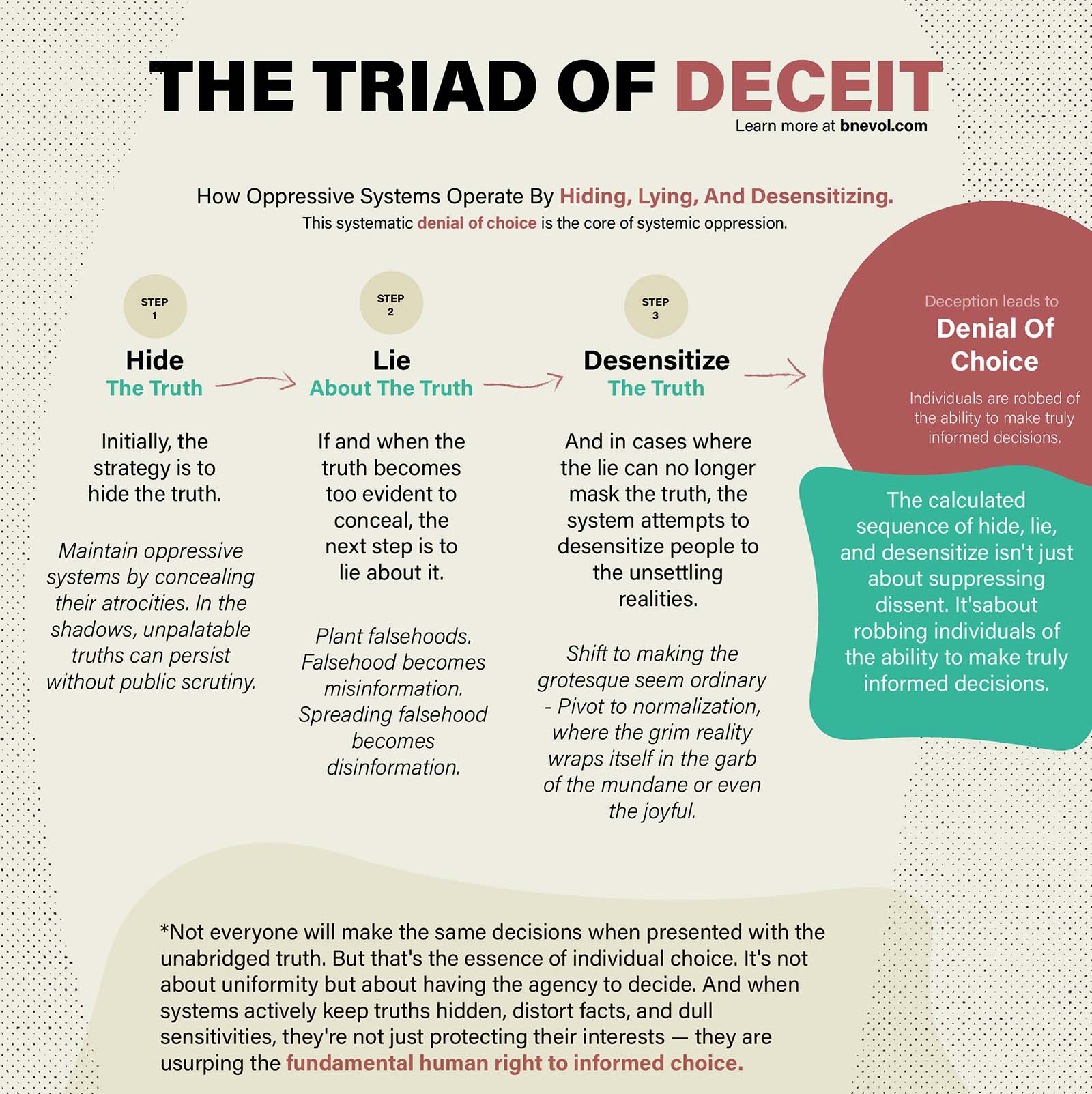
Deception - Unmasking the strategy behind the Triad of Deceit, whose tactics are to conceal, mislead, and numb. Central to the essence of oppression is exerting control and stripping away an individual's power to challenge it. The intricate web of oppressive systems' tactics — hiding, lying, and desensitizing — isn't merely about protecting industries or quelling dissent. It's about systematically robbing individuals of their autonomy to make informed decisions.
When observed closely, oppression follows this predictable sequence designed to distort reality and suppress autonomy. Initially, the strategy is to hide the truth. If and when the truth becomes too evident to conceal, the next step is to lie about it. And in cases where the lie can no longer mask the truth, the system attempts to desensitize people to the unsettling realities before them. By design, the outcome is the denial of choice.
Diet aside, it's estimated that the average adult makes about 35,000 remotely conscious decisions each day. How you make your decisions matters. Universal oppression operates across an indiscriminate landscape to systematically deceive and deny individuals their autonomy and fundamental human right to informed choice. And, the terrain of oppression is expansive, occupying every corner of decision-making we aim to explore, whether that's our food system, healthcare, local/global politics, social justice, conflicts and war, climate, education, personal finance, or more seemingly inconsequential decisions like what clothes to wear, where to shop, what to watch, or the music we listen to. In all cases, the sequence of deception is identical.
This understanding elicits a fundamental question for us all. Are your choices your own? Or is someone choosing for you? Do you even know?
Let's delve into each tactic within the sequence:
1.) Hide the Truth:
The first line of defense in maintaining an oppressive system is concealing its atrocities. In the shadows, unpalatable truths can persist without public scrutiny.
|
According to the Food and Agriculture Organization, an estimated 92.2 billion land animals are slaughtered annually in the global food system. |
Over a quarter billion animals are killed every day. What's more unfathomable is that the number doesn't include sea animals, mainly because the volume of fish and other seafood and "byproduct" killed is so enormous it is challenging to measure with any certainty. Many assume it easily overshadows land animal slaughter manifold. As inconceivable as it may be, it is not a stretch of math to project a billion animals collectively being killed every day behind closed doors. Their living conditions are unimaginable, often subjected to cramped spaces where they cannot move around freely and endure painful seedless pain, illness, and suffering. In a system whose only concern is profit, there is little to no regard for their well-being. Slaughtering practices are often horrific and excruciating. We're not talking about being shot or euthanized, which is also an atrocity. Still, more often, a system of slaughter at scale such methods would be far less efficient to conduct the types of mass execution needed to satisfy the system. So, instead, mass numbers of animals are starved, gassed, suffocated, dismembered, boiled alive, or even sent through machine grinders alive, etc.
By keeping these grim realities shrouded in secrecy, individuals remain blissfully ignorant, making it easier to keep them disconnected from the implications of their choices. By strategically keeping these harsh realities hidden from public sight, people are denied the knowledge needed to make conscious choices. The saying, "If slaughterhouses had glass walls..." underscores the power of transparency. While not everyone may turn vegan upon seeing these grim realities, the transparency arms individuals with the information they need to determine how that knowledge will impact their choices.
In the civil rights movement, Dr. Martin Luther King Jr. understood the profound power of visibility. He knew capturing the brutalities and aggressions against Black people on camera would make the truth inescapable. The broadcasting of these horrors provided the masses with undeniable evidence of systemic oppression, galvanizing support and catalyzing change. Just as MLK leveraged the truth to combat racial oppression, revealing the hidden atrocities of the animal industry is crucial to arming people with knowledge to challenge these systems.
2.) Lie About The Truth:
When the truth starts peeking through the veils, the system often resorts to blatant lies, preying on the public's lack of information. Usually, a clear-cut falsehood is all it takes, as people generally lack the background or context to recognize the deceit.
However, when a simple lie won't suffice, misinformation and disinformation become the tools of choice. Misinformation involves the accidental spread of false or misleading information, often due to ignorance or error. Disinformation, conversely, is a deliberate attempt to mislead through the distribution of false narratives.
For instance, "humane washing" in the animal industry is a prime example of such disinformation. Terms like "free range" might evoke images of animals basking in open pastures. Still, in many cases, it means only slightly better conditions than the appalling industry standard. Another misleading representation is the idyllic image of "family-farmed" animals. These operations pretend to be the antithesis of industrial animal farming. However, the reality is that many family farms, constrained by economic pressures, employ practices that are distressing for the animals, with conditions similar to more extensive industrial operations.
Moreover, when these tactics don't provide enough cover, and the facts are undeniable, they resort to a more insidious method: DARVO. This acronym stands for Deny, Attack, and Reverse Victim and Offender. It's a tactic used to sidestep responsibility and project blame onto others, creating confusion and making it difficult for the truth to gain traction. A typical example of this can be found in the arguments surrounding wildlife population control. For instance...
|
Have you ever heard someone claim that "if we didn't hunt and kill deer, they would overrun the planet?" |
This assertion reverses the roles, painting humans as the potential victims of an overpopulated deer world, thereby justifying hunting. In doing so, the real issues — such as habitat destruction or human encroachment on natural landscapes — are obscured, and the blame deftly shifts.
3.) Desensitizing The Truth:
Lastly, when the truth breaks through the web of lies, the strategy shifts to making the grotesque seem ordinary - Pivot to normalization, where the grim reality wraps itself in the garb of the mundane or even the joyful. Milk cartons depict cheerful cows in pastures, BBQ joints have playful pigs as mascots, and commercials turn the act of insect extermination into a celebration. This numbing strategy seeks to ensure that even when faced with reality, individuals are conditioned not to question or feel discomfort. Through cheerful imagery and clever marketing, the public is conditioned to see, but not truly register, the reality. The goal is to make the disturbing commonplace, ensuring that even when faced with the raw truth, there's no spark of questioning or discomfort.
The calculated sequence of hide, lie, and desensitize isn't just about suppressing dissent. It's about robbing individuals of the ability to make truly informed decisions. The heart of the matter is choice. The series of manipulative tactics is not about ensuring everyone makes the same decision but rather about robbing them of the information needed to decide for themselves. Not everyone will turn vegan or vegetarian when presented with the unabridged truth. But that's the essence of individual choice. It's not about uniformity but about having the agency to decide. And when systems actively keep truths hidden, distort facts, and dull sensitivities, they're not just protecting their interests — they are usurping the fundamental human right to informed choice. This systematic denial of choice is the core of systemic oppression.
Carrying Forward the Flame: Today's Black Vegan Activist Lifting the Torch of Civil Rights Activism and Animal Liberation
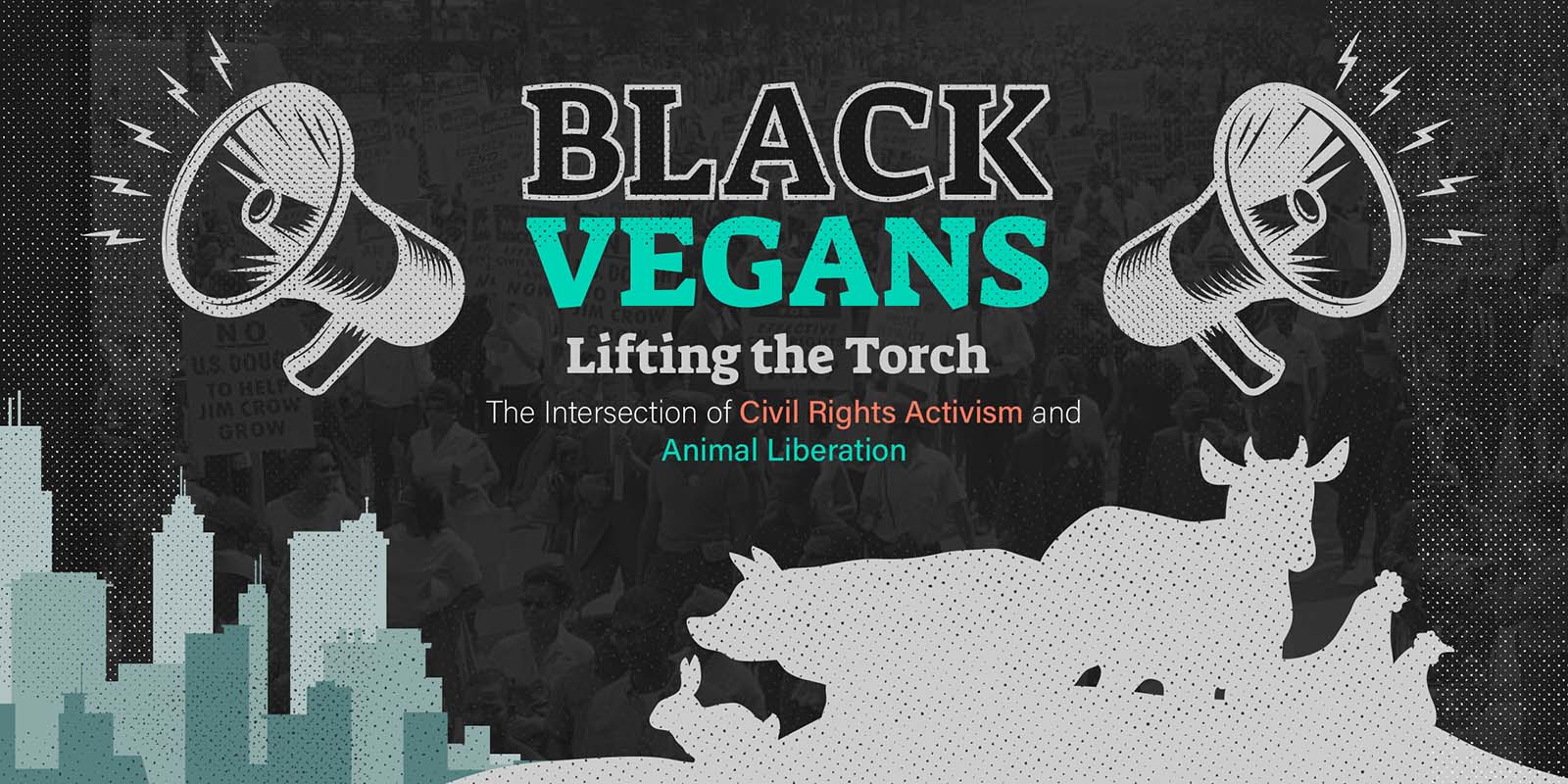
As we reflect upon the era of civil rights leaders, we see an unmistakable awakening to the parallel oppressions faced by humans and animals. These leaders, already engaged in a fierce battle for human dignity and rights, became increasingly aware that the same oppressive systems they combatted were also brutally wielded against nonhuman life. While they recognized and occasionally voiced these parallels, the monumental demands of their human-centered civil rights battle did not allow for an equally fervent championing of animal rights.
Nikki Ford - Animal Rights Is Not a 'White Thing'
The Unbound Project - Dr. A. Breeze Harper
Today, we're in a transformative phase. The groundwork laid by these pioneers, combined with the socio-cultural evolution, has ushered in a new era of activists. The new work is not a mere continuation but a progression. Modern Black activists, armed with the teachings and sacrifices of the preceding generation, are venturing further, picking up the charge for animal liberation. The progression of the journey is not about receiving a passed torch but lifting it anew with renewed vigor, focus, and intent.
Vegan America: A Conversation with Syl Ko
Racism as Zoological Witchcraft: Aph Ko on Multidimensional Liberation
When Angela Davis heralds food sovereignty and animal liberation as the next revolutionary frontier, her proclamation isn't a mere afterthought; it's an acknowledgment that the landscape of justice and liberation is ever-expanding. The movement for animal liberation, which scarcely existed during the civil rights era, is now taking shape and momentum, primarily due to activists, including many from the Black community, who see the interconnectedness of all life.
|
"As long as we are continuing to contribute to the normalization of exploiting others, it's always going to have an impact on our overall society. Because when we make way for some discrimination - it makes way for much more discrimination." - Soul Eubanks |
Episode 9 - Green Carpet Interviews: Yvette Baker | Animal Liberation Activist
In this new era, Black vegans and activists aren't simply amplifying existing calls for justice; they're resonating a newer, broader, and more inclusive anthem for liberation. They are lifting the torch higher, fusing the dreams of past civil rights champions with their contemporary aspirations, striving for a world where every life, human or nonhuman, is treated with compassion and equity.
|
A then 11-year-old Black activist, Aiyana Goodfellow, tells an audience, "Today, millions of animals will die in the name of human greed. Every single one fights for their life. Every single one doesn't want to die..." She implores, "You know it is your duty to be their voice and stand up for their lives as you would hope others would fight for you." |
Aiyana Goodfellow
Black Vegans: The Avengers of the Animal Liberation Movement
In the vast tapestry of history, Black individuals have repeatedly emerged as trailblazers, consistently confronting and challenging oppressive systems. From the shackles of slavery to the brutalities of colonization and systemic racism to economic marginalization, the Black community has shown remarkable resilience, determination, and strength. This history, replete with tales of perseverance, forms the foundation of Black vegans' unique position within the vegan movement.
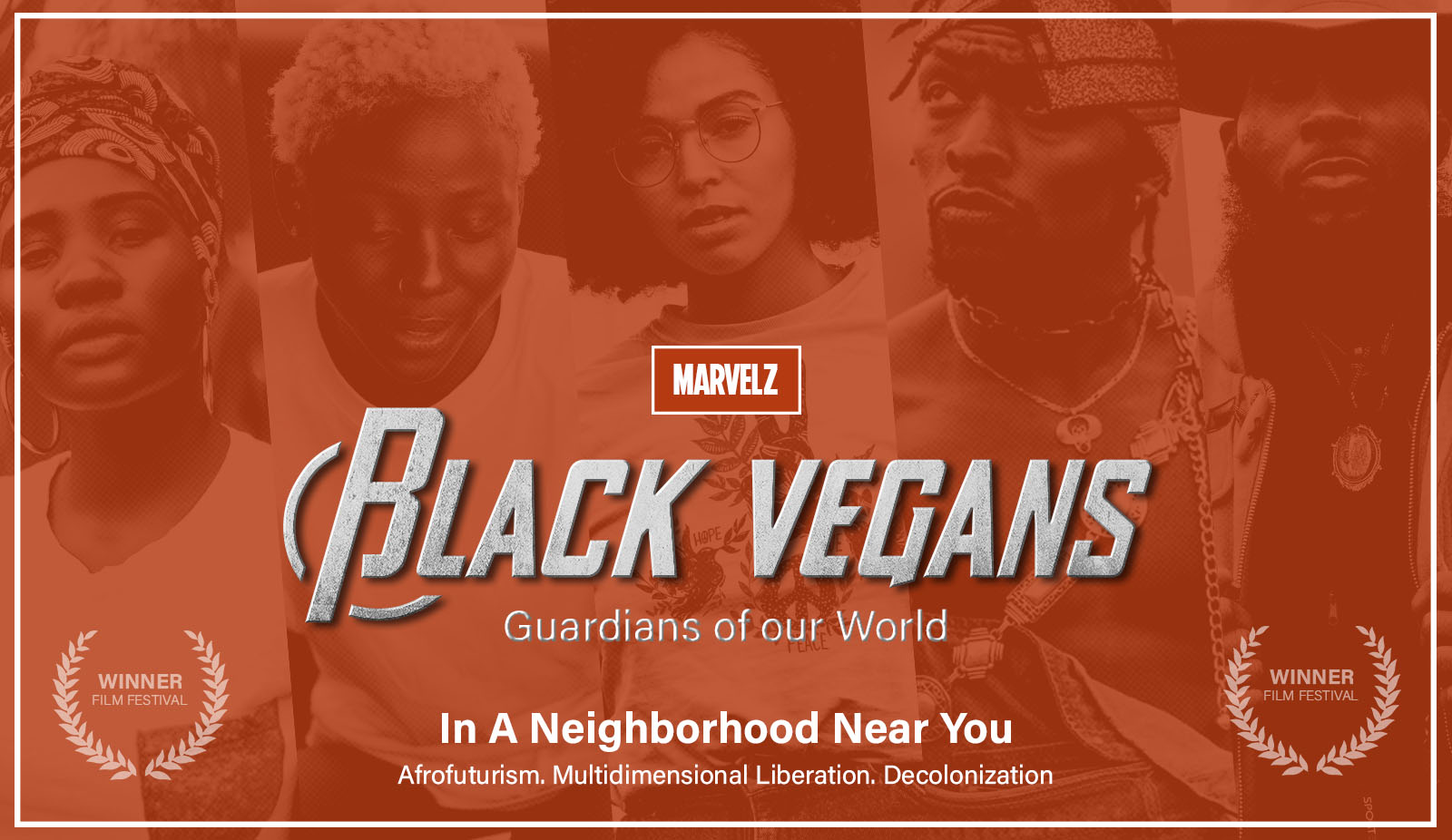
Now, let's entertain a playful analogy for a moment. If we were to think of the Marvel Universe, where the Avengers stand as the vanguard against the formidable forces of evil, Black vegans could very well be the superheroes poised to confront one of our world's most pervasive villains: unchecked capitalism and its oppressive manifestations.
1. Heart of a Leader: The Black Panther leads with an unwavering moral compass. Similarly, Black vegans, fortified by their history of challenging systemic oppressions, can guide the vegan movement with wisdom, offering insights that only those who've grappled with multi-layered forms of discrimination can provide.
2. Unyielding Strength: Just as Thor wields his mighty Mjölnir, Black vegans carry the legacy of generations who have fought oppression. This heritage endows them with an unyielding strength, a tenacity to challenge the capitalist systems that exploit marginalized human communities and drive the massive industrial machine that commodifies and oppresses animals.
3. Empathetic Vision: With sight that is more penetrating than Hawkeye's sharp gaze, Black vegans can discern the parallels between human and animal oppression. This clarity enables them to illuminate the intersections where systemic injustices meet, making them invaluable advocates in the fight for animal liberation.
4. Mastery Over Adversity: Like Black Widow's unparalleled agility in the face of danger, Black vegans nimbly navigate a world where their choices often face scrutiny, armed with the knowledge of their intersectional history and its resonance with the principles of veganism.
5. Guardians of the Planet: Black vegans aren't just fighting for today. Like the Guardians of the Galaxy, they're visionaries, safeguarding the future for generations to come. They recognize that the unchecked forces of capitalism, if allowed to persist, threaten marginalized communities, animals, and the planet we call home.
Black vegans bring a deep-rooted understanding of oppression, making them a formidable force within the vegan movement. With their unique superpowers, they're poised to confront the evils of capitalism and bring about a more just, compassionate, and equitable world for all, whether human or animal. In the ongoing battle for animal liberation, the vegan movement doesn't just need allies—it needs superheroes. And Black vegans? Well, they are yet another layer within the broader Black community that's accustomed to saving the day - for everyone.
More Avengers Of The Animal Liberation Movement
Genesis Butler
Eloísa Trinidad
3 ways going vegan helped my anti-racism advocacy | Christopher Sebastian | TEDxTUWien
Stewart Mitchell
Diverse Advocacy Among Black Vegans: Unity in Challenging Oppressive Systems
While this article highlights Black vegan activists who anchor their efforts on Animal liberation as a foundational route to achieving total liberation, it's vital to recognize the diverse spectrum of Black vegans who weave animal rights into their broader advocacy. Many are pretty well-known and deservingly so for their advocacy. At the risk of leaving anyone out, I won't attempt to amass an exhaustive list here but recognize that their work is crucial to the overall movement. Their presence and contributions in various areas of the movement are indispensable. As with any coalition, the synergy of these interconnected advocacies is paramount: each facet of the movement not only complements but also amplifies the others, creating a powerful consortium that challenges and seeks to dismantle entrenched oppressive systems.
Total Liberation Vs. Tiered Liberation: Uncovering Blindspots in Hierarchical Oppression.
The pursuit of justice and equality often bifurcates into two pathways: one seeks to elevate within existing hierarchies, while the other strives to dissolve these oppressive systems altogether. Both paths have their merits, but it's essential to understand the overarching implications of each. Crucially, blindspots in our understanding, especially concerning the intersectionality of animal oppression with other forms of subjugation, can inadvertently hamper a movement's progress. Recognizing and addressing these blindspots not only strengthens the logical foundation of the movement but also elevates its potential for transformative change. At its core, the quest for animal liberation exemplifies this expansive, holistic vision — advocating for dismantling hierarchies that perpetuate oppression rather than merely aspiring to elevate one's position. While it is certainly okay to focus your passion and work within a single movement, doing so without a broader understanding of intersectionality is a blindspot that unwittingly reinforces the cycles of oppression we seek to break.
However, it's also essential to tread gently when discussing the various movements and initiatives that might still need to recognize the intertwined nature of their goals with those of animal rights, aiming to educate further and increase our collective knowledge and understanding. While their intentions are noble, there's a risk of inadvertently fortifying hierarchies by seeking elevation within them instead of targeting the roots of these oppressive structures.
In an interview with Carrie Freeman, Aph-Ko beautifully encapsulates this nuance: "We need to break down these borders and really re-familiarize ourselves with the territory of oppression because our theory isn't matching the landscape." She also emphasizes "if someone does something differently because they're situated differently in society and they're using their own perspective and lens to kind of talk about animals that's fine too" while encouraging others in their movements to "incorporate the idea of the animal within your own logic because you're going to produce beautiful insights...
|
"... what we need is more movements and more voices not one movement just getting more and more diverse... we need the knowledge to be diverse." - Aph-Ko |
Yvette Baker further elucidates the pitfalls of internalizing hierarchies through a historical lens. She draws parallels between colonialist oppressions and those faced by animals. The cycle is evident: the oppressive tactics first levied on animals found their way into the subjugation of various human groups. Thus, our modern challenges with racism, colonialism, and other systemic injustices have their roots in the original sin of speciesism.
In episode 9 of the Green Carpet Interviews, Baker further reflects on the danger of solely seeking a more favorable position within an oppressive hierarchy:
|
"I challenge the idea even that we are sometimes against unjust hierarchies, and that we just want a better placement within these systems... we completely ignore as Black folks that there might be a rung below us." - Yvette Baker |
In essence, the fight for justice isn't a zero-sum game where gains in one arena mean losses in another. Instead, it's a harmonious push where each movement, recognizing its interdependence with others, can amplify the collective pursuit of total liberation. True justice isn't about elevating within the confines of oppressive hierarchies but dismantling them altogether, thereby granting freedom to all, irrespective of species, race, gender, orientation, or any other divisive marker.
From Civil Rights to Universal Liberation
At the heart of our exploration lies a profound recognition - the oppressive systems that marginalized human groups mirror those exact systems oppressing animals. The civil rights movement, replete with its iconic leaders and transformative ideologies, opened our eyes to the multifaceted dimensions of oppression. Through the lens of this movement, Black animal rights activists today perceive a stark intersectionality, recognizing a shared suffering under normalized oppressive systems.
As we journey through the annals of history and modern activism, we are reminded that celebrating differences is central to the fabric of a just society. Whether it's the diversity in human cultures or the vast array of species that grace our planet, our differences make us unique, beautiful, and invaluable.
Every life, irrespective of its form or origin, harbors aspirations for freedom, dignity, and liberty. Just as the civil rights pioneers dreamt of a world free from racial oppression, animals, too, have their inherent desires to live free from harm. Our challenge is not to seek sameness to find value but to recognize that every being's intrinsic worth and aspirations are valid in their own right.
As we look ahead, let's be inspired and motivated by the new Black liberators forging the way. Support their work, spread their messages, and consider ways to get involved. Let us be guided by a broader, more inclusive vision of multidimensional liberation, where every life is celebrated, cherished, and allowed to flourish in its unique brilliance.
A few actions you can take after reading this article, from curiosity to direct action.
1.) Continue Your Journey - The More You Know
Aph and Syl Ko
Quench your curiosity with further exploration into the psyche and social politics of Black veganism by checking out the prolific collection of writings and conversations in the Book Aphor-ism
Book: Aphro-ism: Essays on Pop Culture, Feminism, and Black Veganism from Two Sisters
Amazon Link: https://www.amazon.com/Aphro-ism-Culture-Feminism-Veganism-Sisters/dp/159056555X
As described on Amazon: "In this lively, accessible, and provocative collection, Aph and Syl Ko provide new theoretical frameworks on race, advocacy for nonhuman animals, and feminism. Using popular culture as a point of reference for their critiques, the Ko sisters engage in groundbreaking analysis of the compartmentalized nature of contemporary social movements, present new ways of understanding interconnected oppressions, and offer conceptual ways of moving forward expressive of Afrofuturism and Black veganism."
Also, check out Black Vegans Rock, a website highlighting influential Black vegans who were doing incredible work to dismantle traditional stereotypes of veganism.
Visit The Website: Black Vegans Rock
Dr. A. Breeze Harper
For nearly two decades, Dr. A. Breeze Harper has written about Black Feminism, food justice, critical studies of race, racial justice, and ethical consumption. Here Sistah Vegan platform has become a resource for other advocates within the movement.
Visit The Website: abreezeharper.com
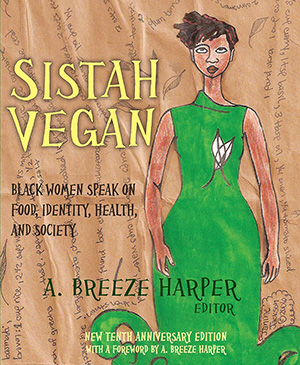
Book: Sistah Vegan: Black Women Speak on Food, Identity, Health, and Society
Amazon Link: https://www.amazon.com/Sistah-Vegan-Female-Identity-Society/dp/1590561457
As described on Amazon: "Sistah Vegan is a series of narratives, critical essays, poems, and reflections from a diverse community of North American Black-identified vegans. Collectively, these activists are de-colonizing their bodies and minds via whole-foods veganism. By kicking junk-food habits, the more than thirty contributors all show the way toward longer, stronger, and healthier lives. Suffering from type-2 diabetes, hypertension, high blood pressure, and overweight need not be the way women of color are doomed to be victimized and live out their mature lives. There are healthy alternatives. Sistah Vegan is not about preaching veganism or vegan fundamentalism. Rather, the book is about how a group of Black-identified female vegans perceive nutrition, food, ecological sustainability, health and healing, animal rights, parenting, social justice, spirituality, hair care, race, gender-identification, womanism, and liberation that all go against the (refined and bleached) grain of our dysfunctional society. Thought-provoking for the identification and dismantling of environmental racism, ecological devastation, and other social injustices, Sistah Vegan is an in-your-face handbook for our time. It calls upon all of us to make radical changes for the betterment of ourselves, our planet, and―by extension―everyone."
2.) Get Involved:
Soul Eubanks, Founder of APEX Advocacy
If you are ready to explore more direct ways to confront the systems and move into action, check out APEX Advocacy.
Visit Their Website: APEX Advocacy
As described on their website "APEX Advocacy aims to increase the number of BIPOC individuals who participate in animal activism by advocating for collective liberation through animal rights, particularly in marginalized areas and communities that are disproportionately affected by the animal industrial complex."
The recently launched "P.A.A.W." initiative is a rare revolutionary and groundbreaking program that's a FREE animal activism training and educational experience for Black, Indigenous, and People of Color interested in becoming vegan.
|
Contact me here: https://bnevol.com/contact Reach me on LinkedIn here: https://www.linkedin.com/in/jbaskerville/ Want to chat it up? Book a time with me here: https://calendly.com/bnevol |
Author
John "Zehn" Baskerville, PMP

